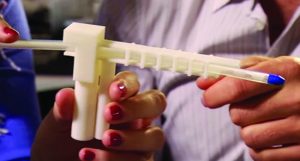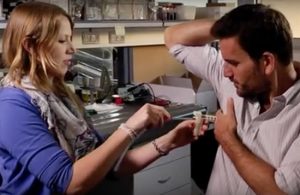×


We have detected your country as:
Please click here to go to the USA website or select another country from the dropdown list.
Pneumothorax is a medical emergency: the collection of air in the pleural space separating the lung from the chest wall, causing it to collapse and resulting in suffocation. Pneumothorax is caused by chest trauma, and is believed to be responsible for over a third of preventable deaths on the battlefield and in terror attacks.
The current treatment involves two steps: a fast needle decompression of the thorax (between the neck and abdomen, where the lungs and other vital organs are located), followed by a 10-minute tissue separation and tube insertion procedure into the chest to drain air and blood, allowing the lung to re-inflate.
“This is a very laborious and technically difficult procedure,” said Dr. Ariel Drori, an internal medicine expert at Hadassah Medical Center, “leading caregivers to neglect the second step in favor of rapid evacuation from the scene to the hospital.”
The need for an alternative solution was made evident by a recent wave of stabbing attacks that left dozens of Israeli civilians dead or wounded. Members of the BioDesign: Medical Innovation program, created by the Hebrew University of Jerusalem and its affiliated Hadassah Medical Center, set out to solve this problem.
 ThoraXS is a one-handed thoracic portal opener that shortens the procedure time of chest-tube insertion from minutes to less than 30 seconds. Its closed knife-shape allows fast penetration of the pleural space, and its mechanical opening mechanism enables rapid and easy opening of a portal through which a chest tube can be quickly inserted. ThoraXS is thus a single-step, rapid life-saving solution for treating pneumothorax.
ThoraXS is a one-handed thoracic portal opener that shortens the procedure time of chest-tube insertion from minutes to less than 30 seconds. Its closed knife-shape allows fast penetration of the pleural space, and its mechanical opening mechanism enables rapid and easy opening of a portal through which a chest tube can be quickly inserted. ThoraXS is thus a single-step, rapid life-saving solution for treating pneumothorax.
 Prof. Yaakov Nahmias, director of the Hebrew University’s Alexander Grass Center for Bioengineering, said: “Our students responded to terror attacks by developing life-saving medical devices, an approach that is the very essence of our BioDesign: Medical Innovation program. ThoraXS is a life-saving innovation that exemplifies our commitment to helping the local and global communities through practical research and development projects.”
Prof. Yaakov Nahmias, director of the Hebrew University’s Alexander Grass Center for Bioengineering, said: “Our students responded to terror attacks by developing life-saving medical devices, an approach that is the very essence of our BioDesign: Medical Innovation program. ThoraXS is a life-saving innovation that exemplifies our commitment to helping the local and global communities through practical research and development projects.”
Source: Excerpt of an article, Hebrew University of Jerusalem
Photo Credit: Medagadget.com/Hebrew University
All logos and trademarks in this site are property of their respective owner. All other materials are property of Bridges for Peace. Copyright © 2024.
Website Site Design by J-Town Internet Services Ltd. - Based in Jerusalem and Serving the World.